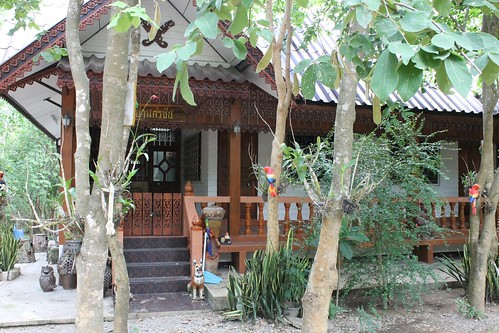KHON SAN, CHAIYAPHUM— Frustrated by years of government inaction, 169 families took back a fraction of the land that was once theirs in protest of unfair policies. Among neatly planted rows of eucalyptus trees, they moved illegally into the Khon San Forest Reserve and established Baw Kaew village on 17 July 2009.
A month later, the Forest Industry Organization (FIO) filed charges against thirty-one Baw Kaew villagers for trespassing, obstructing FIO officers from entering the land, and unlawfully consuming natural resources. The residents of the protest village were ordered to leave, but they have stood their ground.
Government policies have made them criminals living on the land that had sustained them for decades.
The Khon San Forest Project was initiated by the Royal Forestry Department (RFD) and then handed over to the FIO in 1978. Under the National Reserve Forest Act, the RFD has the power to declare an area to be a “national reserved forest so as to conserve forest conditions.”
While the RFD is responsible for environmental conservation, the FIO can benefit financially by reforesting and harvesting crops grown for economic value, such as eucalyptus, teak, and cassava.
In the name of the Khon San Forest Project, the FIO evicted 1,000 villagers from 4,401 rai of land in 1978 (one rai equals 0.4 acres). Within ten years, eucalyptus plantations replaced the land that had once been filled with the crops and homes of these 1,000 villagers.
Baw Kaew’s struggle for land rights is not an isolated case in Thailand. The National Human Rights Commission (NHRC) recorded 245 cases of land conflicts directly tied to RFD conservation policies. These policies resulted in the displacement of over 50,000 Thai citizens, many of which were marginalized populations in the Northeast.
In the case of Khon San, the NHRC advised in 2007 that evicted villagers should be able to return to their land immediately. The FIO ignored this recommendation.
In response to the large number of similar land rights conflicts throughout the country, the Democrat Party-led government granted permission for thirty-five villages to pursue community land titles in 2010—Baw Kaew among them. Under the scheme, communities willing to hold their land collectively could petition for community land titles that would allow them to stay in the reserved forest legally.
The road to gaining this form of land tenure, though, has proven to be cluttered with bureaucratic red tape. Baw Kaew has not been able to make much progress.
In 2013, Baw Kaew leaders worked with local governments to get running water and electricity extended to the community, but the FIO immediately intervened with legal action. It sent a letter to the Electricity Generating Authority of Thailand (EGAT), demanding it remove the electric generator it had provided to the village.
The case was dismissed and the generator kept thanks to the legal help provided through the Isaan Land Reform Network (ILRN).
Baw Kaew villagers are condemned to legal purgatory until the FIO returns the land and recognizes the rights it violated thirty-five years ago.
Another occupant of the forest has had better luck. Less than one kilometer down the road from Baw Kaew stands Wat Soon Dhamarasamee, a Buddhist temple and meditation center. It sits on twice the amount of land as Baw Kaew and occupies much of the land taken from Baw Kaew villagers.
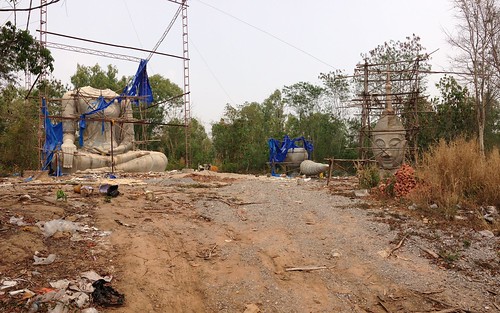 Construction of the temple began in 1998. Much of the grounds remain partially constructed and unkempt.
Construction of the temple began in 1998. Much of the grounds remain partially constructed and unkempt.
The Soon Dhamarasamee Life Development Center was set up in 1997 as part of the FIO’s attempt to address numerous land rights conflicts in the area. The 1996 FIO head felt that returning disputed land was not the best way to address these conflicts. He instead proposed five projects to develop the quality of life of community members.
Soon Dhamarasamee was the only project pursued. It was originally intended to serve as a senior center, garden, tourist attraction, and market for local farmers to sell produce. Its overall purpose was to enrich the lives of community members. Construction started in 1998.
While the official name is Soon Dhamarasamee Life Development Center, patrons have referred to it as Wat Soon Dhamarasamee for the past three years.
Walk past the main temple structure to find the shell of the building originally intended to serve as the senior center. Now it is nothing more than a dilapidated structure, showing no signs of having been a home for the elderly. Rooms remain unfurnished, animal feces litter the floor, and a Buddha statue smiles fixedly under a thick layer of dust.
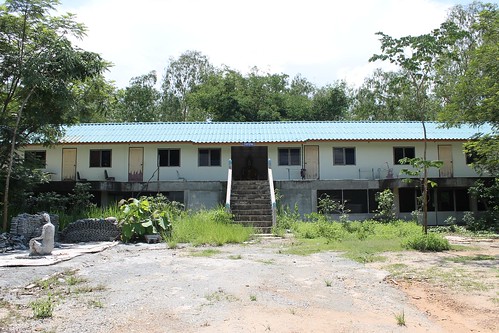 The senior center
The senior center
Land that might have once been used as a garden is now riddled with weeds and plastic bottles.
Currently, four individuals—two monks and two groundskeepers—reside on the 123 rai occupied by the temple. The homes of the temple residents starkly contrast the deteriorated senior center.
According to an official from the RFD who asked not to be named, meditation centers—not temples—are permitted in reserved forests. Only after these centers have gone through approval hearings on a sub-district, district, provincial, and national level, can construction begin. Temple structures can take up no more than fifteen rai of land, but the surrounding grounds of the temple can be much more expansive.
An unnamed source close to Wat Soon Dhamarasamee estimates that half of the temple’s visitors are from Chaiyaphum Province—a far smaller percentage of these visitors are from Khon San district. The rest of the visitors travel from central provinces, Bangkok, and other countries.
Soon Dhamarasamee caretaker's residence on FIO land.
The permission the temple has to stay in the reserved forest appears to contradict RFD policy. The source abovementioned claims that a person of royal blood sponsors the temple. According to the RFD official, while it is common for members of the royal family to fund religious projects, it does not sponsor temples in reserved forests. However, the FIO head reportedly told villagers that a member of the royalty has supported the temple from the beginning.
This alleged royal association potentially dissuades government bodies from taking legal action against Soon Dhamarasamee.
Counter to the original purposes, Baw Kaew villagers do not seem to benefit from the temple. Current RFD policy stipulates that meditation centers in reserved forests must serve the surrounding communities and interact with local villagers. Due to the temple’s inability to serve the community’s needs, Baw Kaew villagers currently refrain from visiting.
Main caretaker and original advocate of Soon Dhamarasamee, Prathuang Bungpraphai, claims that temple monks collect alms from all surrounding communities, including Baw Kaew.
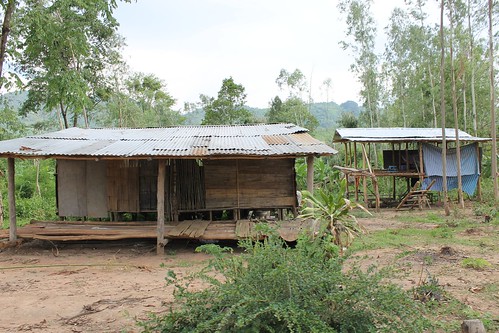 Homes in Baw Kaew among FIO-planted eucalyptus trees.
Homes in Baw Kaew among FIO-planted eucalyptus trees.
According to the headman and several villagers of Baw Kaew, the monks no longer collect alms from their village. This has been corroborated by Pramote Phonphinyo, a local NGO working with the ILRN, and land rights lawyer Tanom Sakrawachai.
“The temple doesn’t have any impact on the community at all because we don’t interact,” states village leader Nid Dtawtoon.
Wat Soon Dhamarasamee has fulfilled neither its original purpose nor requirements set by the RFD. Tourism is the only function the temple meets. There is no market, no garden, and no functioning senior center. It caters more to the needs of an international following than it does the surrounding community.
There are several rai of cassava fields on temple grounds, but it is unclear whom they benefit. Mr. Prathuang explained that these fields are designated to help local farmers. However, when Baw Kaew villagers asked the temple for a plot of land to grow vegetables, they were denied.
In contrast to the expansive temple property, eighty families in Baw Kaew currently live and work on a meager 120 rai. Due to continued prosecution, the simple act of inhabiting the land puts their freedom at risk every day.
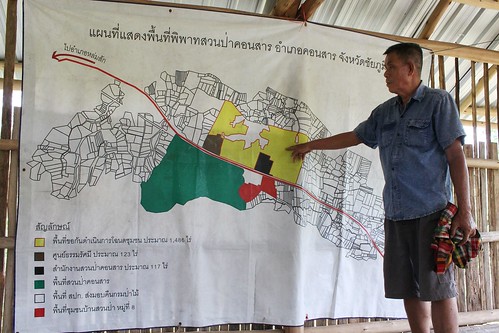 Nid Dtawtoon stands with the map of Khon San Forest Project land that hangs in Baw Kaew's community center.
Nid Dtawtoon stands with the map of Khon San Forest Project land that hangs in Baw Kaew's community center.
The yellow represents the land they are trying to obtain a community land title for.
The FIO’s management of the Khon San Reserved Forest has been unfair to the area’s rural poor. Their legal actions both deny Baw Kaew essential human rights—land and livelihood—and directly contradict the constitution, supposedly the highest word of law in the country.
According to Constitution, “Persons assembling as to be a community…shall have the right to conserve or restore their customs, local wisdom, arts or good culture… and participate in the management, maintenance and exploitation of natural resources…”
The RFD official admits, “if the person who wants to build a center is powerful, violations may occur.”
“In Thai culture, power is more important than the law,” stated Mr. Tanom. This sentiment unfortunately gains more and more truth with each day the villagers of Baw Kaew continue to face injustice.
Meanwhile Wat Soon Dhamarasamee stands in peaceful contrast to its neighbors. While Baw Kaew fights for basic human rights, the temple down the road plans for its next celebration.
---------
Sara Diaz and Maren Meyers have been studying development issues in the Northeast of Thailand. Sara studies Cognitive Neuroscience at The University of Pennsylvania, and Maren studies Environmental Science and English Literature at University of Wisconsin—Madison.


